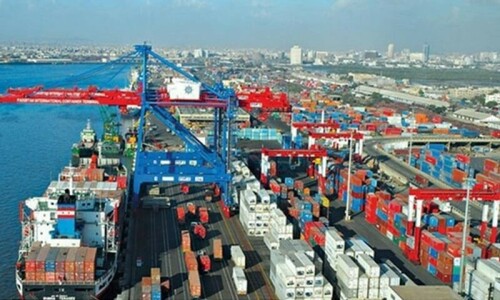IT was in 1992 that a strategist working on the Clinton presidential campaign coined the phrase, “It’s the economy, stupid,” which would go on to figure among the most noteworthy slogans that propelled Bill Clinton to his first term in the White House in January 1993.
The early 1990s also saw another leader, Manmohan Singh, come to the fore as India’s finance minister in the (P.V. Narasimha) Rao cabinet at a time when India’s economy was in as much distress as Pakistan’s is today.
India’s foreign exchange reserves stood at $5.8 billion at the start of 1991. The ongoing financial crisis put pressure on this figure and it continued to fall till India decided to ship out (with a buyback option) and lease bullion (its gold reserves) in order to buttress its reserves. It had a foreign debt of over $70bn and a fiscal deficit of nearly 10 per cent.
“After years of mismanagement and living beyond one’s means, it was payback time. The government had been spending more than its revenues (fiscal deficit) and the country importing more than exporting (current account deficit). A sharp rise in crude prices, triggered by the oil shock of 1990-91, meant India was suddenly paying more for fuel while its exports to the region slowed to a trickle.”
This piece is an attempt to shake our Neros, who seem forever committed to (political) fiddling, to sit up and take notice.
Writing in the Economic Times in 2016, Vinay Pandey summed up the state of affairs in 1991 in the words quoted above. Pandey’s description sounds so familiar when one examines the state of Pakistan’s economy today. Strangely, amidst all the doom and gloom, it can rekindle hope too.
Manmohan Singh realised that with the reserves covering a mere two/three weeks of imports, something radical had to be done. Given carte blanche by his prime minister, he embarked on an ambitious programme to liberalise the economy.
By the end of 1991, India was able to repurchase, as per a clause in the leasing/sale agreement, all the gold bullion it had shipped out as foreign investment started to flow in. Google it and you’ll find every detail of the Singh miracle that propelled his country from a state of near-default to having over half a trillion dollars in forex reserves ($594.9bn on Aug 18, to be precise) in just 30 years.
Many of our compatriots look with envy at India and the influence it enjoys globally. They also complain that the state of civil liberties in India — particularly in places such as Kashmir and Manipur, and the general state of minorities and the atrocities being committed against them in that country — are overlooked by usually pro-human rights Western nations. It’s an unfair world, many of us say.
My only response to that is: it’s the economy, stupid. Look at the size of the market where, even by the most conservative standards, the middle class is at least 300 million people; by more liberal estimates, the number could be approaching half a billion.
Side by side with this, look at India’s economic growth that has even defied the global trend reflecting the sudden spike in energy prices after the Russian invasion of Ukraine, which disrupted supplies either because of the unstable security situation or the sanctions on Moscow.
Of course, it would be over-simplistic to attribute India’s economic miracle to just the Singh reforms. All through the years of the centrally planned economy of the Nehru years, India invested in education, setting up prestigious centres of learning such as the centrally-funded (heavily-subsidised) Indian Institute(s) of Technology (IITs). There may have been six up until the 1990s; today the number stands at nearly two dozen.
The standard of education is evident from just one anecdote that left me surprised, even shocked, if I am honest. In 1993, my nephew who had gone to MIT after his ‘A’ levels, told me that MIT offered qualifying IIT students direct transfers to the second and third years of its four-year degree programmes.
This is not meant to be an ode to India or its economy, but a reminder of what is possible to attain in a mere 30 years if one sets one’s mind to it. It is important to make sure when such an economic boom happens, opportunities are spread horizontally and the needs of the deprived sections are assigned top priority.
Another safeguard must be against the scourge of ‘crony’ capitalism, charges of which against the Modi government are taking the gloss off the Indian economy and the ‘shining India’ slogan in no uncertain terms.
This piece, especially the quote from Vinay Pandey’s Economic Times article, is an attempt to shake our Neros, who seem forever committed to (political) fiddling, to sit up and take notice.
We cannot forever import more than we export, and we cannot in perpetuity spend in excess of our revenues. That is a recipe for disaster. Our country needs to generate resources, but not by increasing the tax burden on the minuscule minority that pays all it owes via deductions from salaries.
With runaway inflation and the rupee in free fall ensuring there is no arresting that slide, we can’t continue to burden the low-income segment with high energy bills and ever-increasing food prices and indirect taxes.
In the very immediate near term, we have to look at finding new ways of generating revenue, such as taxing the trillions kept in real estate and the retail sector. The last parliament empowered the caretakers to take such decisions. They should.
For now, some hard-pressed Pakistanis are burning their electricity bills in protest. God knows what else they’d be prepared to burn in anger as their deprivation increases. We need to act — and act fast.
The writer is a former editor of Dawn.
Published in Dawn, August 27th, 2023
















































Dear visitor, the comments section is undergoing an overhaul and will return soon.